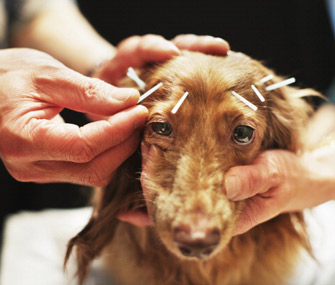A Vet Explores the Benefits of Acupuncture for Pets — and Herself
Published on December 09, 2014

Early this summer, I was keeping really active and fit. I took a hiking trip out West, ran at least a couple of times a week and practiced hot yoga every other day. It was awesome. Until my body broke down.
Turns out, one of my hip flexors didn’t want to keep up. And when it rebelled in the middle of a Bikram class, so too went the rest of me. Off to my GP I went.
“It’s a hip flexor injury,” she confirmed. “Try these ‘nondrowsy’ muscle relaxants and take OTC anti-inflammatory meds twice a day for two weeks. Let’s see what happens after that.”
Nothing. Massage, rest and more anti-inflammatory meds intervened somewhat positively, yet more disastrous yogaing eventually ensued. X-rays revealed nothing. My next step was an MRI, at which point I balked.
Let’s not blow my entire deductible on what’s almost certainly a simple — if painful and frustrating — tear of the deep iliopsoas muscle, I reasoned. At which point I asked my GP about acupuncture.
“Why not? You have nothing to lose except more time and a bit more money.”
On to acupuncture I went.
Acupuncture in Veterinary Medicine
I respect acupuncture as an alternative modality. Though I’m picky about those who practice it, I’m always willing to send my patients to a highly credentialed, well-regarded veterinary acupuncturist.
And I’m not alone. Though once regarded as a semiscience with hippie-dippie connotations, the therapy has become so widely accepted in recent years that plenty of veterinarians are taking continuing education coursework in this area and even pursuing certification as bona fide veterinary acupuncturists.
What’s more, pet owners are adopting the therapeutic approach in droves. So much so that the more progressive pet health insurance companies are beginning to cover it. In fact, my sister’s geriatric Malamute mix is currently undergoing a course of acupuncture for his back, and her pet insurance carrier is covering 90 percent of the fees.
But Does It Work?
In vet school one of our board-certified anesthesiologists talked up acupuncture as more science than art. Sure, there was plenty of so-called “artistry” involved, he explained, but no more than in a well-executed surgical procedure. Pain and anxiety relief, circulatory disease management, and the support of stressed organs were only some of the benefits he espoused.
He urged us to accept that acupuncture is a science worthy of its own study within the context of veterinary medicine. Which explains why he literally wrote the book on the subject.
Most of us took that to heart as evidence of acupuncture’s efficacy. Which probably accounts for why veterinarians today take a positive approach to the field — especially when it comes to chronic pain — and why someone as hardheaded and pressed for time as I am would submit to a series of acupuncture sessions.
So did it work? Sure did. No MRIs for me. No physical therapy. Just more yoga. Which is all my body really needs. That is, until something breaks down again. And it’s bound to, right? Sigh.
For more on veterinary acupuncture, consider these informative links: American Veterinary Medical Association, International Veterinary Acupuncture Society and American Academy of Veterinary Acupuncture.
More on Vetstreet.com:





